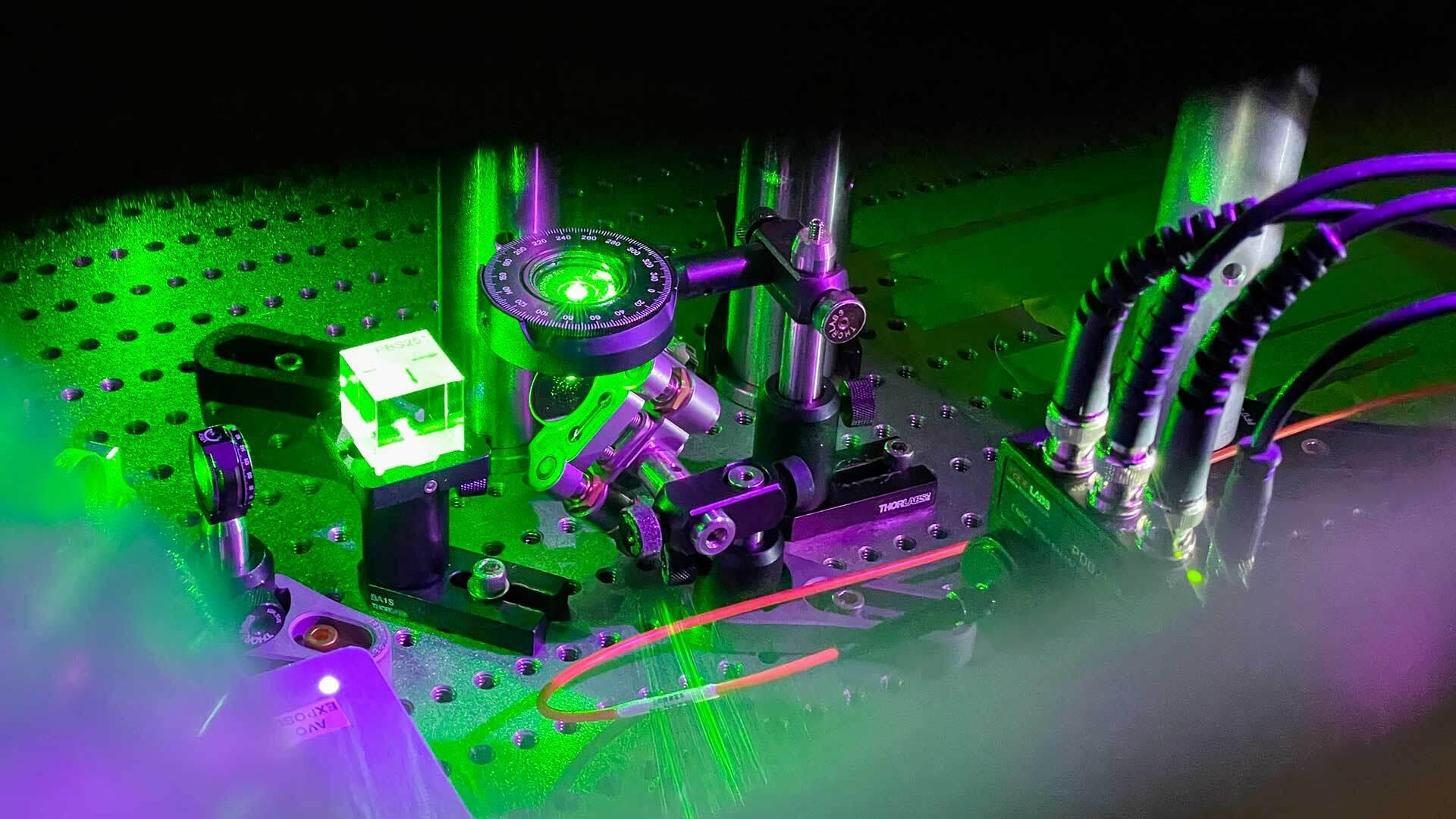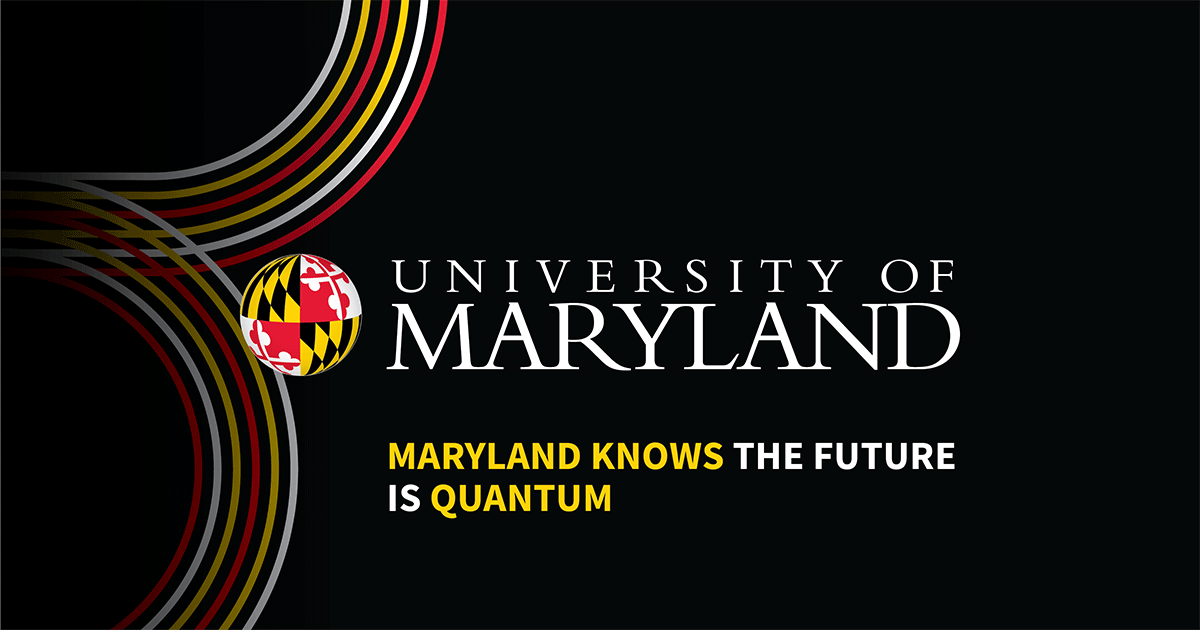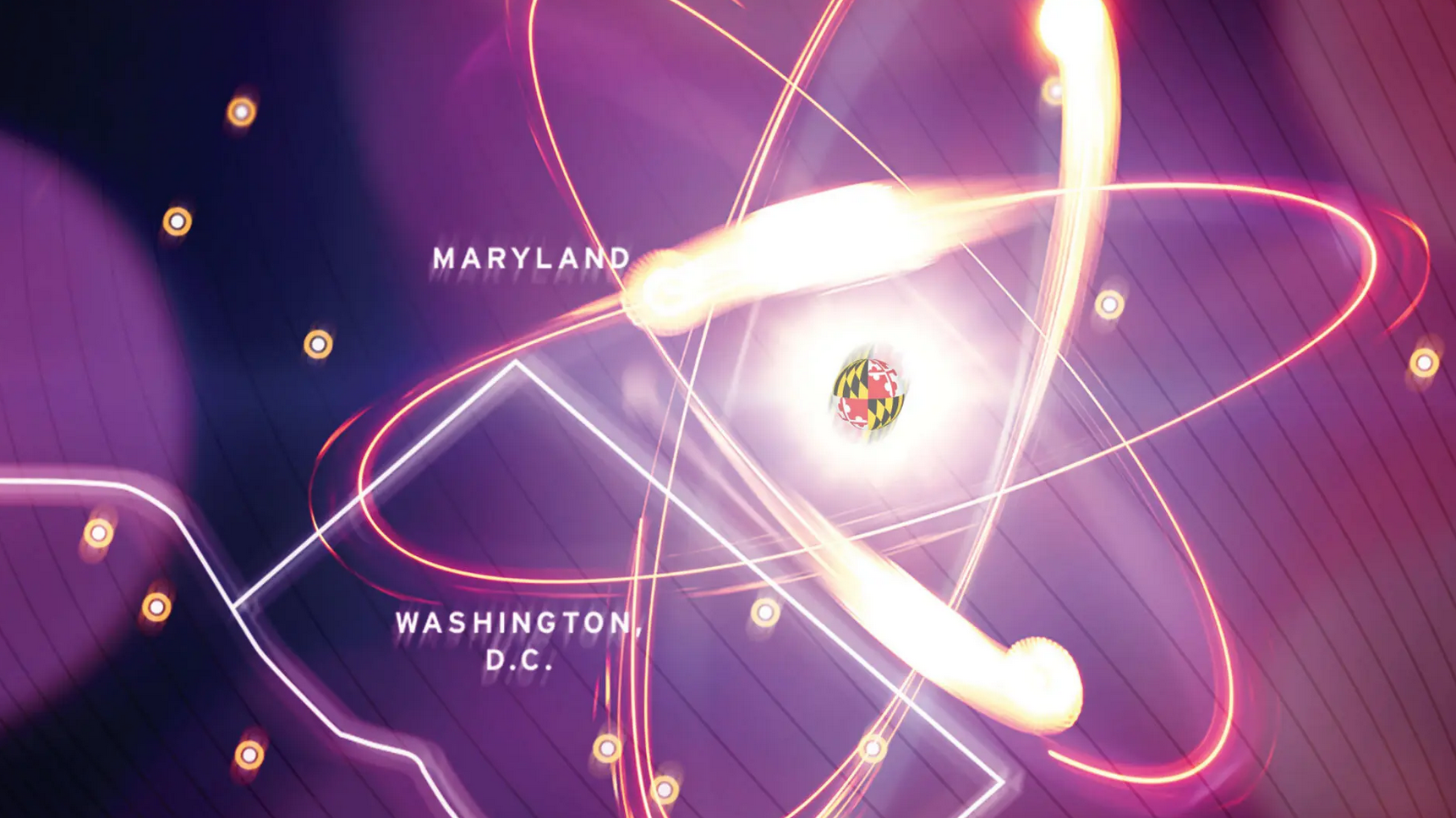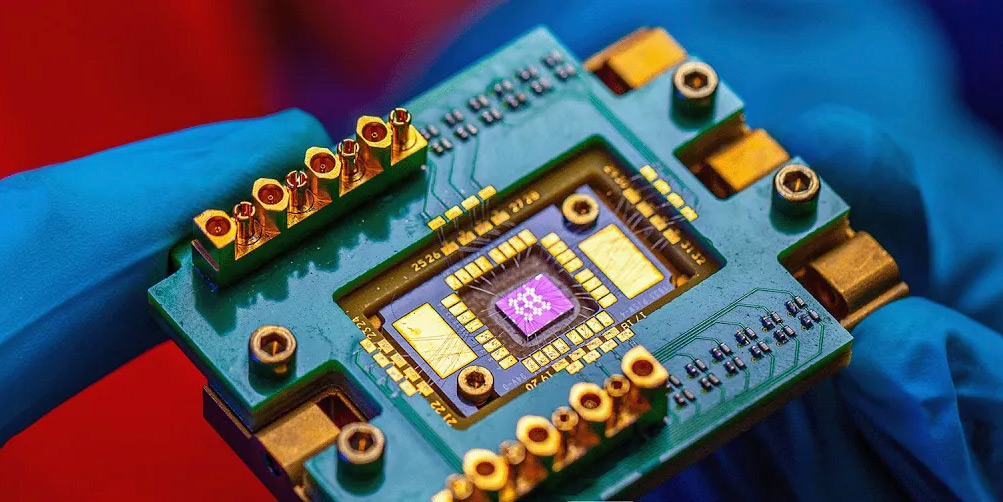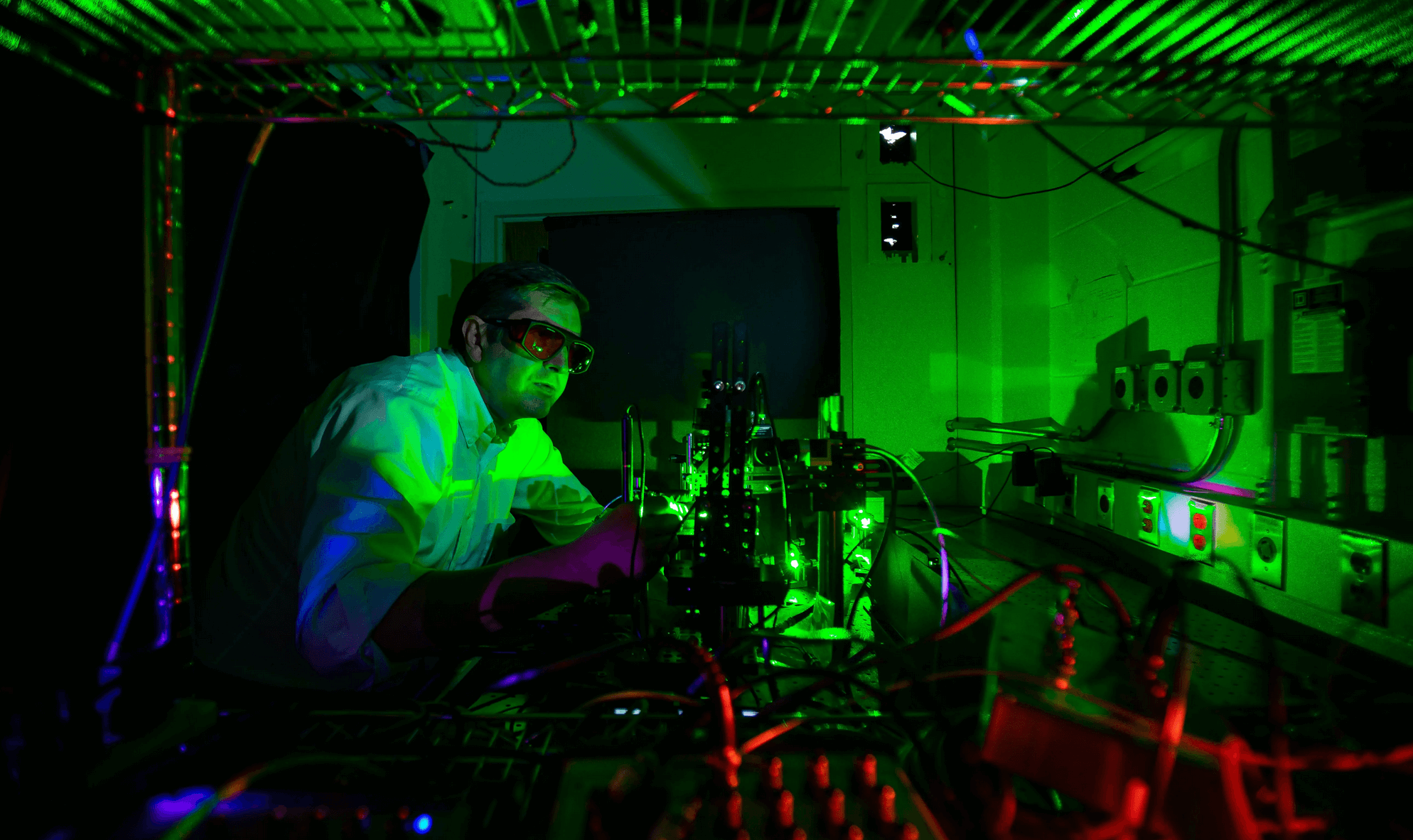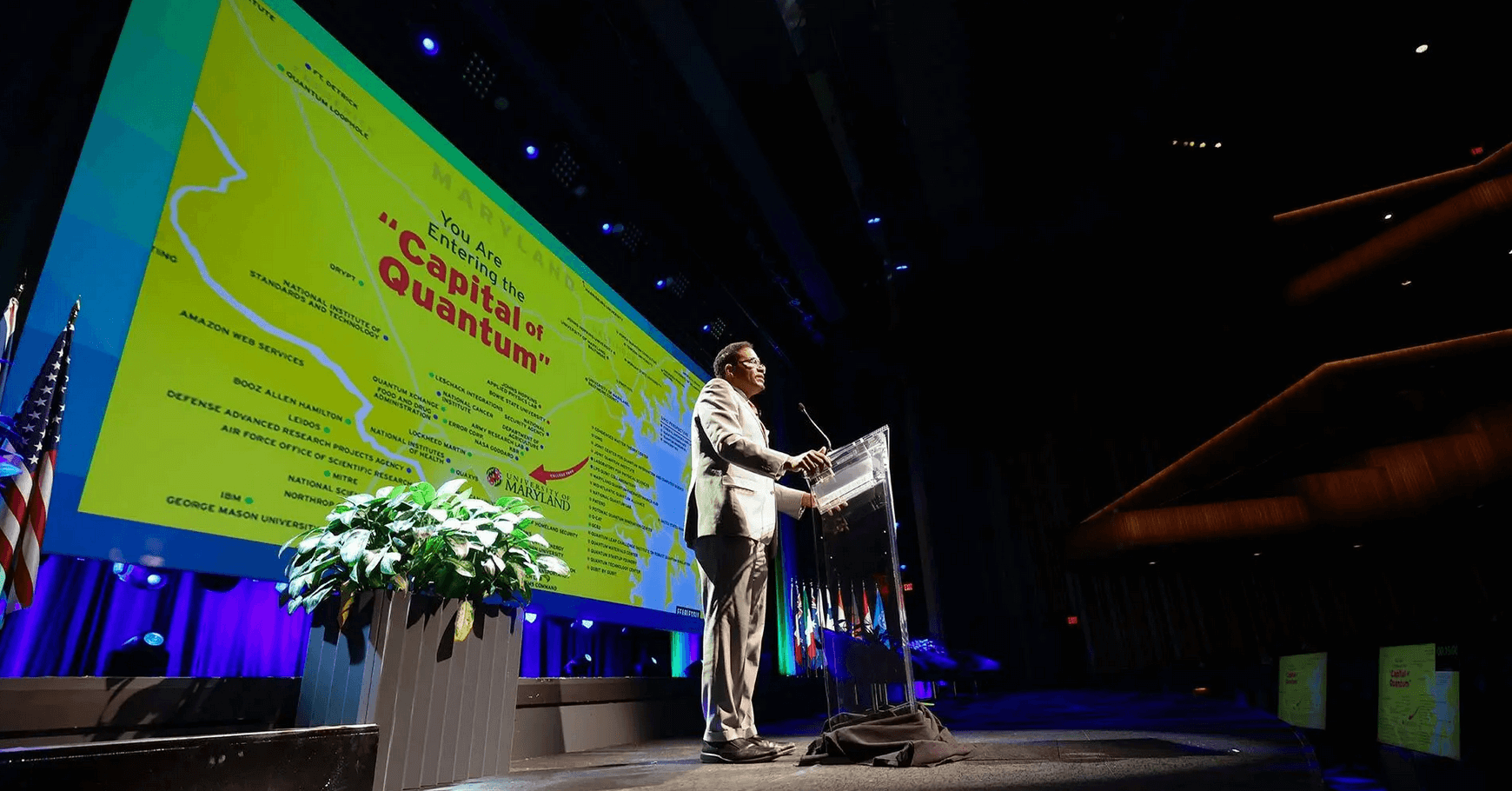
Quantum Innovation
There are many resources available to support innovators focused on creating impactful quantum solutions.
Resources at UMD
The University of Maryland is a powerhouse of discovery, with decades of experience advancing a field that will help define our nation’s—and the world’s—future. UMD is a hub for quantum research and development. Here, over 200 quantum scientists and engineers are exploiting the unique properties of quantum physics to usher in a new age of technology: quantum computers capable of currently impossible calculations, ultra-secure quantum networking and exotic new quantum materials.
Centers
- Condensed Matter Theory Center (CMTC) was created in 2002 by the University of Maryland with the Distinguished University Professor Sankar Das Sarma as its permanent Director. The support for CMTC comes from UMD and the Laboratory for Physical Sciences (LPS). The purpose of CMTC is to maintain sustained research excellence in theoretical quantum condensed matter physics and quantum computing at UMD.
- Joint Center for Quantum Information and Computer Science (QuICS) is a partnership between the University of Maryland (UMD) and the National Institute of Standards and Technology (NIST). Located at UMD, the center advances research and education in quantum computer science and quantum information theory.
- LPS Qubit Collaboratory (LQC) is a national Quantum Information Science Research Center hosted at the National Security Agency’s Laboratory for Physical Sciences (LPS) at UMD. LQC advanced the development of qubits through an innovative model of collaboration between the government and a wide range of partners across the country.
- Maryland NanoCenter promotes major nano research and education initiatives, provides one-stop shopping for those seeking expertise and/or partnerships at Maryland, and supplies infrastructure to facilitate nano activities at Maryland through equipment, staff support, and informational and administrative functions.
- Quantum Materials Center (QMC) is focused on the fundamental exploration and development of advanced materials and devices using multi-disciplinary expertise drawn from physics, chemistry, engineering and materials science departments, placing strong emphasis on the pursuit of optimized and novel quantum phenomena with potential to nucleate future computing, information and energy technologies.
- Quantum Technology Center (QTC) - Together with its partners, QTC will exchange ideas and opportunities to Innovate, Translate, and Educate in quantum technology. The goal of the QTC Partners Program is to develop mutually beneficial relationships in the rapidly emerging field of quantum technology. QTC will have a global impact creating translational technologies to address some of society's toughest challenges. Areas of research include: Quantum Algorithms, Quantum Computing & Simulation, Quantum Communications & Networking, Quantum Materials, and Quantum Sensing.
Groups
- Photonic Quantum Systems (PhoQuS) group, led by Prof. Saikat Guha, investigates mathematical foundations of quantum information theory, its applications to quantum optics, and experimental system designs for attaining quantum precision limits of photonic information processing.
Hubs
- Maryland Quantum-Thermodynamics (QTD) Hub is uncovering how everyday phenomena emerge from microscopic quantum dynamics, we are illuminating fundamental physics while establishing a lodestone for North American quantum thermodynamics. We address thermodynamic emergence from three angles: (1) How quickly does entanglement dissipate? (2) How similar is entanglement’s dissipation to time’s arrow? (3) To what extent can quantum phenomena hinder time’s arrow? We are answering these questions via mathematical derivations, computer simulations, and experimental design. Pursuing this research unifies our team into a Maryland-centered hub—a capital for North American quantum thermodynamics—providing focus and galvanizing the growth and international impact achieved by counterparts abroad. We are working to establish Maryland as a quantum-thermodynamics leader through an international conference, symposia, seminars, and a visitors program, atop our research.
Institutes
- Institute for Physical Science and Technology (IPST) pursues interdisciplinary research and education at UMD. The Institute provides support for theoretical and experimental research in areas at the intersection of traditional disciplines.
- Institute for Research in Electronics and Applied Physics (IREAP) is a joint institute of the College of Computer, Mathematical, and Natural Sciences and the A. James Clark School of Engineering. The mission of IREAP is to advance modern science through research and educational programs that are interdisciplinary between physical science and engineering. The flow of knowledge between basic science and engineering at IREAP is bidirectional: applying basic science skills to problems of practical importance and engineering skills to aid in fundamental scientific investigations, with an emphasis on diversity, quality, and excellence. IREAP is recognized internationally as a leading university research center and conducts experimental and theoretical research in many areas; e.g., high-temperature plasma physics, plasma spectroscopy, microwave electronics, high-brightness charged particle beams, laser-plasma interactions, nonlinear dynamics, biophysics, ion beam microfabrication techniques, nanoscience, and nanotechnology.
- Institute for Robust Quantum Simulation, with the support of the National Science Foundation, uses quantum simulation to gain insight into and take advantage of the rich behavior of complex quantum systems. Work at the Institute is organized into three major research challenges: Verified Quantum Simulations, Quantum Simulations Face the Environment, and Scalable Quantum Simulations for Science and Technology.
- Joint Quantum Institute (JQI) conducts curiosity-driven research that explores the most basic building blocks of nature with an eye toward potential applications in information science and technology.
- Maryland Institute for Quantum Applications, launched by UMD’s Applied Research Laboratory for Intelligence and Security (ARLIS), will investigate how technologies such as quantum computing, networking and sensing can lead to new strategic tools and systems.
QuICS Fellowships: The Joint Center for Quantum Information and Computer Science offers the Hartree and Lanczos fellowships to support exceptional postdoctoral researchers and graduate students, respectively, in all areas of research relevant to QuICS.
In addition, QuICS hosts NRC Postdoctoral Fellows who are advised by QuICS Fellows employed by NIST, as well as numerous postdoctoral researchers and graduate students who are advised by QuICS Fellows.
LQC National Quantum Fellowship is designed to support talented U.S. citizen graduate students within the field of quantum information science and technology (QIST). By stimulating U.S. graduate student participation in QIST-based research, the LQC National Quantum Fellowship addresses one aspect of the LQC’s mission of fostering the development of a highly skilled and knowledgeable QIST workforce for the nation in support of the National Quantum Initiative. With a preference to superconducting and semiconducting approaches, research topics must be connected to advancing qubit device creation or implementation and may be experimental or theoretical in nature. While the emphasis is on quantum computing, proposals for quantum sensing and networking will also be considered. All fellows are afforded the opportunity to visit and collaborate directly with the LQC, its personnel, and make use of the state-of-the-art equipment onsite. In addition, all fellows are expected to present a poster or oral presentation at the annual LQC Program Review (LQCPR) in College Park, MD.
MathQuantum Fellowships: High school, undergraduate, graduate, and postdoctoral fellowships are a core element of our Research Training Group. Ideal candidates for our fellowships are:
- current Math students with little or no experience in quantum information science (QIS), who want to enter this exciting research area, and
- current students with moderate or high experience in QIS who want to advance their QIS work with stronger Math skills.
Our program aims to fill any skills and knowledge gaps to enable crossover research between mathematics and quantum information science.
Discovery Fund is an early-stage investment fund aimed at fostering the growth of technology companies in Prince George's County, Maryland. With an annual budget of up to $1 million, the fund provides support to innovative startups in various fields such as quantum technologies, cybersecurity, data analytics, and biomedical devices. It offers both dilutive capital (like equity and convertible debt) and non-dilutive capital (grants). To be eligible, companies must be growth-focused startups located or willing to relocate to Prince George's County and demonstrate potential for market returns and regional economic benefits.
Maryland Industrial Partnerships Program (MIPS) provides funding, matched by participating companies, for university-based research projects that help the companies develop new products. The program is administered at the flagship campus at the University of Maryland, College Park, and works throughout the 12 member institutions of the University System of Maryland, plus Morgan State University and St. Mary’s College. In these academic-industrial, public-private partnerships, MIPS connects the resources of the Maryland public universities to businesses from all parts of Maryland. With MIPS matching funds, companies can leverage the facilities, resources and expertise within Maryland’s public universities to create new products and opportunities.
UMD has amassed a total of 58 new inventions, 96 patent applications, and 30 issued patents over the last 3 years (2022-2024). With over 30 years of quantum research, UMD is ranked #2 among public institutions in quantum physics and has over 200 researchers with a focus on quantum science.
Patents and intellectual property (IP) are a critical input and the raw material for successful innovation ecosystems. The world’s first public company in quantum, IonQ, was hatched from patented inventions in UMD research labs.
Three examples of quantum technologies developed at UMD include:
Quantum light generation on a chip - A multi-timescale coupled resonator lattice system for broadband, high-yield, and robust multi-harmonic generation. This technology uses a lattice of coupled silicon nitride ring resonators with two tunable timescales to enable broadband, efficient multi-harmonic light generation on a chip, overcoming fabrication limits and requiring no active tuning, while preserving robust signal propagation.
Quantum computing architecture for industrial applications - A fault-tolerant quantum computing architecture for efficient simulation and scalable computation with physical fermions. This technology is a fault-tolerant quantum computing architecture using physical fermions and advanced error correction, enabling faster, more efficient, and scalable simulation of complex materials and molecules for industrial-scale quantum computing applications.
Optical data transmission with improved reliability - A quantum-enabled error correction system for enhancing reliability and efficiency in optical data transmission. This technology uses quantum measurements and adaptive error correction to boost the reliability of , enabling ultra-low error rates and efficient communication even at very low light levels, surpassing classical performance limits.
To explore more quantum technologies and additional intellectual property available at UMD, search the UM Ventures Tradespace online repository.
Applied Research Laboratory on Intelligence and Security (ARLIS) - Established in 2018, the University of Maryland Applied Research Laboratory for Intelligence and Security’s primary sponsor is the Office of the Under Secretary of Defense for Intelligence and Security. ARLIS is a university-affiliated research center (UARC), serving the government as an independent, objective trusted agent. One of 15 designated Department of Defense UARCs in the nation, ARLIS conducts applied research and benefits from a sole-source contract which expedites engagement with offices throughout the DoD and IC. ARLIS is a strategic government asset focused on sociotechnical challenges. Conducting both classified and unclassified research, ARLIS uses scientific rigor to address security and intelligence challenges in the human domain. ARLIS is the home of the Maryland Institute for Quantum Applications.
National Quantum Laboratory at Maryland (QLab) is a user facility supporting the global community developing near-term, real-world quantum computing and networking applications and talent. In concert with other quantum initiatives at UMD, QLab provides a supporting infrastructure for an innovation ecosystem for quantum technologies and offers a supporting environment for thought leadership to come together for the exchange/sharing of ideas in the evolving space of quantum technologies. QLab provides unique research and teaching opportunities using innovative technologies in the field of quantum computing to serve the scientific user community at UMD and beyond.
The QLab is a user facility that primarily focuses on providing three types of resources:
- Expertise: Through the Fellows program and UMD's partnerships with leading quantum companies like IonQ, QLab provides users with access to the expertise needed to quickly explore and optimize potential solutions for target applications
- System Access: The QLab currently provides privileged access to IonQ's quantum computing systems, including Harmony (AQ#9), Aria (AQ#25) and Forte (AQ#35). QLab will also soon provide connectivity into the Mid-Atlantic Quantum Internet (MARQI) to serve as a testbed for quantum networking applications.
- Collaboration Space: The QLab features a large collaboration space inside IonQ headquarters that includes a conference room, kitchen, and flexible workspaces with large-RAM workstations to develop and test quantum algorithms.
Quantum Startup Foundry (QSF) brings together the physical and virtual resources needed to support entrepreneurs, startups, and established businesses in accelerating quantum technologies’ time to market. QSF offers two types of programs:
- The Pre-TraQtion program helps navigate the Small Business Innovation Research (SBIR) and Small Business Technology Transfer (STTR) programs for specific topics related to quantum technologies.
- TraQtion is a market accelerator program that leverages UMD quantum centers, the Mid-Atlantic Quantum Alliance (MQA) and other partnerships to connect companies with large government contractors for technology validation and potential customers looking for quantum and quantum-enabling technologies.
- Capital Connections provides access to key partners, programs, and funding.
- UM Ventures College Park - Supports and promotes innovative solutions and emerging ventures by providing legal assistance, business expertise, technical know-how, and more.
- Faculty Startup Program provides a general outline for designing a path to success specific to your needs.
- Startup Fundamentals Workshops are online sessions where attendees learn about a variety of skills necessary for them to transform their research and technology into impactful solutions that can benefit society. These workshops provide attendees useful information, advice, training, and even access to funding opportunities. These workshops provide attendees useful information, advice, training, and even access to funding opportunities. Most workshops are hosted virtually via Zoom and many (but not all) are recorded and are available on the StartupUMD YouTube Channel.
- Startup Process Concierge - The UM Ventures College Park team's goal is to empower UMD faculty and graduate students to transform their research into successful startups by providing resources and customized guidance through rich entrepreneurship ecosystem at the University of Maryland and the State of Maryland.
- UMD Faculty & Graduate Startup Guide - If you have an invention or a great idea for a new venture, then use this interactive guide. Many startup journeys may not be as linear as the steps in this guide, so utilize these resources within the guide from different stages based on what is useful to you.
- UMD I-Corps - I-Corps provides real world training on how to incorporate innovations into commercially viable companies to solve societal problems. The curriculum is based on the Lean Startup framework, through which researchers can better understand the market potential of an innovation.
Do Quantum is a UMD researcher-run non-profit bridging the gap between quantum computing theory and practice. We empower students to become quantum researchers and help companies harness the power of quantum computing.
Undergraduate Quantum Association (UQA) is a research and career-oriented student organization which provides a space for students to engage with and learn more about quantum science! UQA helps to connect the campus community to the frontiers of quantum through various events.
Quantum physics governs everything that's very small or very cold, and it has a reputation for being extraordinarily difficult to understand. We want to change that.
With The Quantum Atlas, we aim to provide an approachable guide to quantum physics for non-experts—anyone looking for an explanation of a quantum concept they read about in an article or heard about on the radio. To that end, we've created images, animations, short podcasts and written explanations of the most fundamental quantum concepts, and we're planning to add more as The Atlas grows.
The Quantum Atlas is a place where anyone can learn about quantum physics.
- New to quantum? Check out the Get Started page!
- Want to explore and learn more about quantum? Then click below on some quantum-related entries. Click here to see all of the quantum-related entries.
The Quantum Atlas is supported by a grant from the National Science Foundation's Advancing Informal STEM Learning program (Award #1713387). It is also supported by the Joint Quantum Institute, a research partnership between the University of Maryland and the National Institute of Standards and Technology with the support and participation of the Laboratory for Physical Sciences, and the Illinois Quantum Information Science and Technology Center. Questions or comments? Please email us at quantumatlas@umd.edu
Resources Across the DMV for Quantum Innovators
Mid-Atlantic Quantum Alliance was formally launched in January 2020 to accelerate moving quantum science and engineering to use and further enhance the region’s primacy in a field that promises to revolutionize society. This alliance brings together world-leading quantum expertise from academia, industry, government agencies, laboratories and research centers with a presence in the region. The MQA serves as an inclusive forum, facilitated by the University of Maryland, for its members to engage and collaborate with each other on education, global thought leadership and building a vibrant and diverse ecosystem to support quantum innovation.
Quantum Economic Development Consortium (QED-C) is a consortium of stakeholders that aims to enable and grow the quantum industry. QED-C was established with support from the National Institute of Standards and Technology (NIST) as part of the Federal strategy for advancing quantum information science and as called for by the National Quantum Initiative Act enacted in 2018.
Executive Education 101 Bootcamp: Focus o Qunatum Computing - Are you curious about the impact of quantum computing on your industry and implications for your organization? Quantum-science based advancements, specifically quantum computing has captured attention as a buzzword, but its impact goes beyond just hype. Join us for an immersive workshop where we delve into the fascinating world of quantum computing and equip you to prepare your organization for the future.
George Mason Quantum Internship Program is designed to provide high school students the opportunity to learn about quantum and to gain work experience. Participants will work with quantum practitioners for 6 – 8 weeks on projects that range from education and teaching-related experiences to business and marketing to research.
MITRE Internships & Co-ops - Whether you're an intern pursuing a summer work experience or a cooperative education student pursuing work related to your major or career goal, you'll work side by side with senior staff on crucial sponsor programs. Since intern and co-op assignments can lead to full-time positions following graduation, MITRE will give you the chance to prove what you can do. Each summer, in addition to a meaningful work experience, our 500+ new and returning interns have the opportunity to build new skills by participating in our premier Learning Track Program. Students will also attend technical talks, network with each other, participate in mentorship programs with MITRE staff, and make connections that last.
Pathways to Quantum - In partnership with area K-12 public school systems, Connected DMV’s Potomac Quantum Innovation Center (PQIC) and George Mason’s Quantum Science and Engineering Center (QSEC) are excited to invite rising high school seniors to participate in the Pathways to Quantum Summer Immersion Program. Join peers from around the Greater Washington region for a three-week long hybrid program that includes a week-long job shadowing opportunity where you will learn about quantum and STEM-related careers with leading research universities and industry leading organizations. We will be selecting rising high school seniors from across the DMV to participate.
Quantum Marketplace - Check out available listings of employment opportunities at QED-C members companies. Members include corporations, academic institutions, national laboratories and government agencies working in quantum.
Potomac Quantum Innovation Center (PQIC) - Greater Washington—with its rich foundation of talent, resources, assets, and stakeholders—is poised to lead our nation and the world into the quantum era. However, the region lacks a mechanism to bring these scattered efforts together to accelerate quantum ecosystem formation. By integrating these efforts, Connected DMV has set out on an ambitious path to make the region the premier hub for the next generation of quantum leadership, innovation, and economic development across quantum computing, sensing, communications, and materials.
UMBC Quantum Science Institute is an interdisciplinary institute comprised of faculty and students from 4 different academic departments at UMBC: Computer Science & Electrical Engineering, Information Systems, Mathematics & Statistics, and Physics.
Quantum.Tech conference and exhibition is to drive forward the commercialisation of Quantum applications across industry, and to provide a global, annual meeting place for the Quantum ecosystem.
Quantum World Congress is the world’s premier gathering for quantum technology leaders, innovators, and visionaries. With keynote speakers, interactive sessions, and cutting-edge exhibits, Quantum World Congress fosters collaboration and accelerates the development of the global quantum ecosystem. This annual event highlights the pivotal role of quantum technology in shaping the future, building on Greater Washington’s leadership as a hub for innovation.
Johns Hopkins Applied Physics Lab (APL) - APL provides solutions to national security and scientific challenges with systems engineering and integration, research and development, and analysis. APL’s work in quantum computing goes back decades. In the late 1980s, the Laboratory began investigating quantum entanglement, a topic at the heart of the disparity between classical and quantum physics. APL researchers conducted some of the initial demonstrations of quantum key distribution in the mid-1990s, and in 1996 established a fully operational system for quantum cryptography based on the transmission of single photons in free space under daylight conditions.
- Quantum Devices Laboratory is a key resource for addressing critical challenges in quantum information science. State-of-the-art microwave, cryogenic, and quantum control technologies enable researchers to test new theories and devices critical to harnessing the power of quantum for computing and sensors.
MITRE was established to advance national security in new ways and serve the public interest as an independent adviser. We continue to deliver on that promise every day, applying our systems-thinking approach to provide solutions that enhance our national security and way of life.
- MITRE’s Quantum Moonshot team is building the world’s first fully universal, scalable photonic quantum computer and integrated quantum network.
NASA Goddard Space Flight Center is the premiere space flight complex and home to the nation’s largest organization of scientists, engineers, and technologists who build spacecraft, instruments, and new technology to study Earth, the Sun, our solar system, and the universe.
- Quantum Engineering and Sensing Technology Laboratory (QuEST) Lab provides unique testbeds and world-class experimental facilities to perform research and development and technology maturation of atomic sensors and laser subsystems for space science. Goddard has established a laboratory facility to enable research into emerging technologies in atom-based quantum sensing. This unique facility is designed to connect the quantum and atomic, molecular, and optical physics research community with sensor engineers and end-user scientists.
National Institute for for Standards and Technology (NIST) is the National Metrology Institute for the United States, also known as an NMI. Everything you use in your everyday life works because of measurements. Without precise measurements, your car wouldn’t run, your phone wouldn’t work, and hospitals couldn’t function. We maintain the measurements that make industry and society work. Learn more about our unique role in the national — and global — economy.From nanoscale devices that power the most advanced microchips to earthquake-resistant skyscrapers, NIST’s measurements and research fuel innovation and improve the quality of life for all Americans. We provide support and resources to U.S. manufacturing, helping to grow our economy and ensure our national security.
- Quantum Information Science - NIST has been a leader in quantum information science since the early 1990s and continues to shape the field. Quantum effects set fundamental limits on the precision of physical measurements, so as the nation’s measurement science agency, NIST has a key role in studying and developing standards for quantum measurement. Building on deep expertise with quantum technologies such as atomic clocks and Josephson junctions, NIST scientists developed early building blocks of quantum computing technology, including one of the first quantum logic gates. NIST researchers have also advanced enabling technology for quantum devices, including single-photon detectors and cryogenics.
- The NIST on a Chip program works to bring quantum sensing and measurement science to industry. Much of this research has been done in joint NIST-university institutes, including JILA, a partnership with the University of Colorado, and the Joint Quantum Institute and the Joint Center for Quantum Information and Computer Science, both in partnership with the University of Maryland.
- NIST has helped nurture and grow the quantum industry. NIST convened some of the earliest scientific meetings on quantum information theory and later launched the Quantum Economic Development Consortium to support the nascent industry. Many leaders in the quantum industry today previously worked at NIST or its joint institutes.
- With the launch of the National Quantum Initiative in 2018, NIST now supports a whole-of-government quantum science program. NIST has also taken the lead in developing post-quantum cryptography, which aims to safeguard information from future quantum computers that could break codes widely used today to encrypt data.
The U.S. Army Combat Capabilities Development Command Army Research Laboratory, known as DEVCOM ARL, is the Army’s research laboratory. Nested strategically within DEVCOM and the Army Futures Command, ARL’s mission is to Operationalize Science. A hallmark of ARL’s mission is collaborative partnerships to broaden Army access to expert talent and accelerate transitions of science-enabled capabilities.
- One specific competency of DEVCOM ARL is Photonics, Electronics, and Quantum Sciences - Sciences of materials, devices, and related manufacturing methods for advanced components and systems achieving novel sensing capabilities providing full-spectrum information and decision dominance across all domains.
Build Our Future Grant Pilot Program and Fund (Fund) is a financing resource operated by the Maryland Department of Commerce (Commerce), to provide grants for innovation infrastructure projects intended to support innovation in an eligible technology sector.
Maryland Department of Commerce - Accessing capital and securing financing are essential to start or grow a business—driving innovation and creating jobs are the benefits. Programs include venture capital investments and tax credits, direct loans, grants and loan guarantees. These programs work together to attract new companies to the state, encourage expansions and job creation, and revitalize our economy.
Maryland Global Gateway Soft Landing Program provides international companies with the opportunity to test out the U.S. market at an affordable rate. Soft Landing program partners provide participating companies with access to facilities, resources, advisors, and more. Eligible companies can also receive funding for physical, programmatic, and other costs associated with market entry.
Maryland Innovation Investment Tax Credit (IITC) - IITC fosters the growth of Maryland's technology sectors by incentivizing investment in early-stage companies with the goal of increasing the number of companies developing innovative technologies in Maryland, increasing overall investments in current and emerging technology sectors, and increasing the number of individual investors actively investing in Maryland technology companies.
Maryland Industrial Partnerships Program (MIPS) provides funding, matched by participating companies, for university-based research projects that help the companies develop new products. The program is administered at the flagship campus at the University of Maryland, College Park, and works throughout the 12 member institutions of the University System of Maryland, plus Morgan State University and St. Mary’s College. In these academic-industrial, public-private partnerships, MIPS connects the resources of the Maryland public universities to businesses from all parts of Maryland. With MIPS matching funds, companies can leverage the facilities, resources and expertise within Maryland’s public universities to create new products and opportunities.
TEDCO’s Evergreen Venture Funds are dedicated to funding and growing the next generation of outstanding early-stage businesses in Maryland. We are an experienced team with significant operating and venture experience whose focus is on making the entrepreneurs successful.
UMD has amassed a total of 58 new inventions, 96 patent applications, and 30 issued patents over the last 3 years (2022-2024). With over 30 years of quantum research, UMD is ranked #2 among public institutions in quantum physics and has over 200 researchers with a focus on quantum science.
Patents and intellectual property (IP) are a critical input and the raw material for successful innovation ecosystems. The world’s first public company in quantum, IonQ, was hatched from patented inventions in UMD research labs.
Three examples of quantum technologies developed at UMD include:
Quantum light generation on a chip - A multi-timescale coupled resonator lattice system for broadband, high-yield, and robust multi-harmonic generation. This technology uses a lattice of coupled silicon nitride ring resonators with two tunable timescales to enable broadband, efficient multi-harmonic light generation on a chip, overcoming fabrication limits and requiring no active tuning, while preserving robust signal propagation.
Quantum computing architecture for industrial applications - A fault-tolerant quantum computing architecture for efficient simulation and scalable computation with physical fermions. This technology is a fault-tolerant quantum computing architecture using physical fermions and advanced error correction, enabling faster, more efficient, and scalable simulation of complex materials and molecules for industrial-scale quantum computing applications.
Optical data transmission with improved reliability - A quantum-enabled error correction system for enhancing reliability and efficiency in optical data transmission. This technology uses quantum measurements and adaptive error correction to boost the reliability of , enabling ultra-low error rates and efficient communication even at very low light levels, surpassing classical performance limits.
To explore more quantum technologies and additional intellectual property available at UMD, search the UM Ventures Tradespace online repository.
More Resources for Quantum Innovators
- Creative Destruction Lab Quantum Stream at CDL-Toronto and CDL-Montreal brings together entrepreneurs, investors, scientists in quantum technologies, and quantum technology partners (IBM Q and Xanadu) to build ventures in the emerging domain of quantum computing, optimization, sensing and other applications of quantum technologies. CDL Quantum Stream involves an intensive 4-week technical and business quantum bootcamp instructed by industry and academic leaders in quantum technologies and machine learning, followed by five objective-setting sessions over 10 months. CDL Quantum startups work with mentors to sharpen objectives, prioritize time and resources, raise capital, and engage with experts working on the frontiers of research. CDL is a non-profit organization. There are no fees for participation and CDL does not take any equity. Learn more about the CDL program.
- Duality is a first-of-its-kind accelerator program for next-generation startups focused on quantum and enabling technologies. The 12-month program provides world-class business and entrepreneurship training from its partner institutions and the University of Chicago Booth School of Business. Duality is led by the Polsky Center for Entrepreneurship and Innovation at the University of Chicago and the Chicago Quantum Exchange (CQE), along with founding partners, the University of Illinois Urbana-Champaign, Argonne National Laboratory, and P33.
- IBM Quantum Accelerator - The Accelerator offering is designed to set forward-thinking organizations on the path to quantum advantage: applications for which quantum computers outperform classical computers. It is meant to make quantum computation part of mainstream company workflows for any organization, regardless of quantum computing maturity level. Whether organizations are simply “quantum curious,” or have already invested in building quantum skills, the Accelerator offering is meant to help organizations push themselves further along their path to quantum competency. Not only will participants have premium access to IBM’s world-class quantum computing systems, but they will also have the unique opportunity to work with IBM Quantum experts to explore how this technology can benefit their specific domain—and to ready their teams with the skills and capabilities necessary for a quantum-ready workforce. With the Accelerator offering, we strive to provide tools to spread quantum awareness beyond quantum experts to developers seeking quantum advantages without specific training—putting organizations on track for a truly frictionless quantum experience.
- Luminate is an accelerator and investment fund that awards $3 million annually to 10 companies from around the world that are developing emerging solutions in almost every industry.
- Quantum Systems Accelerator (QSA) is led by Lawrence Berkeley National Laboratory, and Sandia National Laboratories is the lead partner of the center. It is one of five new Department of Energy Quantum Information Science (QIS) Research Centers. The center brings together dozens of scientists who are pioneers of many of today’s quantum capabilities from 15 institutions: Lawrence Berkeley National Laboratory, Sandia National Laboratories, University of Colorado at Boulder, MIT Lincoln Laboratory, Caltech, Duke University, Harvard University, Massachusetts Institute of Technology, Tufts University, UC Berkeley, University of Maryland, University of New Mexico, University of Southern California, UT Austin, and Canada’s Université de Sherbrooke. QSA’s team is dedicated to a mission of pairing advanced quantum prototypes — based on neutral atoms, trapped ions, and superconducting circuits — with algorithms specifically constructed for imperfect hardware to demonstrate optimal applications for each platform in scientific computing, materials science, and fundamental physics.
- The Quantum Industry Coalition (QIC) is the voice of the US quantum industry. QIC is dedicated to maintaining US leadership in the development of quantum technologies. Members range from start-ups to Fortune 100 companies addressing a variety of aspects of quantum technology.
Conference on Lasers and Electro-Optics (CLEO) is the premier international forum for scientific and technical optics, uniting the fields of lasers and opto-electronics by bringing together all aspects of laser technology, from basic research to industry applications. CLEO is the world’s premier international forum to learn about innovative advances, research and new technologies from the laser science industry. From quantum computing to advanced imaging technologies used to the search for new life and planets in the galaxy, CLEO brings together all aspects of electro-optic technologies.
Conference on Quantum Error Correction (QEC), a prestigious biennial event that has been a cornerstone of the quantum research community since its inception in 2007. Previous editions have been hosted in leading international cities, including Los Angeles, California; Zurich, Switzerland; Washington, District of Columbia; London, UK; and Sydney, Australia. This conference convenes distinguished experts from academia and industry to explore cutting-edge research in theoretical, experimental, and technological advancements towards achieving robust quantum computation. Key topics will include quantum control, error correction, fault tolerance, and their intersection with physics, computer science, and technology.
European Quantum Technologies Conference (EQTC)- Serves the Quantum Flagship's goal to consolidate and expand European scientific leadership and excellence in this research area, to kick-start a competitive European industry in Quantum Technologies and to make Europe a dynamic and attractive region for innovative research, business and investments in this field. EQTC 2025, co-organised with the University of Copenhagen as part of the Danish EU Presidency will be held at Øksnehallen, Copenhagen, Denmark, on 10-12 November!
IEEE International Conference on Quantum Computing and Engineering (QCE) bridges the gap between the science of quantum computing and the development of the industry surrounding it. This event brings a perspective to the quantum industry that differs from strictly academic or business conferences. IEEE Quantum Week is a multidisciplinary venue that gives attendees the unique chance to discuss challenges and opportunities with quantum researchers, scientists, engineers, entrepreneurs, developers, students, practitioners, educators, programmers, and newcomers.
OFC, a global event, provides startups with the opportunity to debut while industry leaders set the pace for the future. It includes unveiling pioneering trends that will define the industry’s trajectory and offer solutions to critical global issues such as quantum networking, artificial intelligence (AI), space optics and data-center connectivity.
Photonics North Conference is an internationally recognized event aims to reinforce the connections between theory and application and build stronger ties between university research and industry needs. We welcome leading researchers to share their latest findings, as well as industry exhibitors to present their products and services. We are also delighted to be joined by students who have chosen photonics as a career path: Photonics North is a great opportunity to network with key players in the community.
Q2B is the global stage for quantum innovation, bringing together visionaries, researchers, and industry leaders to drive breakthroughs and shape the future of technology.
qConnect is the premier industry event for quantum technology, bringing together businesses, tech creators, startups, government, and investors to transform ideas into impact. As part of the International Year of Quantum Science and Technology, qConnect features insightful talks, expert panels, and strategic networking opportunities. More than just connections, qConnect drives collaboration and action to shape the future of quantum.
Quantum Connections is an annual conference connecting industry partners, government officials, researchers, and students in an innovative networking conference experience. Hosted by the Institute for Quantum Computing (IQC), this conference aims to create new opportunities for connections within Canada’s quantum landscape.
Quantum Days Satellite Series is a new initiative that will feature focused events across Canada, bringing together the country's quantum community, showcasing our exceptional ecosystem, and reinforcing our position as a global leader in quantum innovation.
Quantum Now is the premier executive forum where decision-makers prepare for the emerging quantum economy .
The Global Industry Challenge is a platform for innovators, entrepreneurs, and industry leaders to engage in collaborative action to solve practical use cases using quantum and quantum adjacencies as AI. This Challenge integrates industry leaders, investment partners, and quantum ecosystems around the world to help scale discovery and enable new solutions that accelerate the commercialization of quantum computing. Working within the International Year of Quantum framework, the Challenge will help amplify quantum awareness and increase talent pipelines over the course of the program. The Challenge will help accelerate the practical implementation of quantum technologies. Discover how quantum computing is being applied to solve real-world problems in various industries such as consumer products, energy, financial services, life sciences, and space.
Google Quantum Software Stack includes open source tools and a quantum computing service to develop novel quantum algorithms.
- Cirq, Google's open source framework, is specifically designed for developing novel quantum algorithms for near-term quantum computers, and building and experimenting with noisy intermediate scale (NISQ) algorithms on near term processors.
- Open Fermion is an open-source platform for translating problems in chemistry and materials science into quantum circuits that can be executed on existing platforms.
- quantumlib - For GitHub repositories, Google's open-source software for the quantum world.
- The Qubit Game - Build a quantum computer, one qubit at a time. Earn points by solving the same challenges quantum engineers face, from keeping qubits cool to blocking cosmic rays.
IBM Quantum Network provides engagement opportunities and resources to academic institutions, startups, and organizations around the world. The Network supports businesses, universities, laboratories, and industry leaders on their journeys to advancing quantum utility. Members gain access to learning resources, experts, and events to accelerate research and foster collaboration. IBM's community of quantum innovation leaders, researchers, developers, and enthusiasts is advancing the field of quantum computing using IBM technology.
Microsoft’s Quantum Ready program helps business and government leaders assess the real-world impact of quantum, define a clear strategy, and build organizational readiness to future proof their investments and harness the full power of quantum as it scales.
- Quantum for good and the societal impact White Paper - Learn more about the three priorities - impact, use, access - that are required to promote positive applications of quantum computing.
- Accelerating drug discovery with HPC, AI, and quantum - Learn how AI and HPC technologies can enhance experimentation in drug discovery today, helping to set the stage for quantum-driven breakthroughs in the future.
Quantum Industry Canada (QIC) is Canada’s premier business-led consortium, which transforms Canada's quantum excellence into strategic advantage and global commercial success. Founded in 2019, we unite industry pioneers and strategic partners to accelerate innovation, connecting an expanding ecosystem of organizations—from groundbreaking startups to global leaders.
Innovare Advancement Center - Led by the Air Force Research Laboratory—Information Directorate (AFRL/RI) and Griffiss Institute, in partnership with top high-tech industrial, leading-edge academic, and forward-thinking governmental stakeholders, this facility is the heart of our global community, focused on what it takes to catalyze the key collaborations that spark innovations in areas critical to U.S. strength and economic competitiveness. The Center has two leading-edge quantum labs.
Prize Postdoctoral Fellowships - The Centre for Quantum Information and Quantum Control (CQIQC) invites applications for its Prize Postdoctoral Fellowship. The program provides funding for the very best postdoctoral applicants, both nationally and internationally, who will contribute to University of Toronto’s program in quantum science and technology.
Non-Dilutive
- Small Business Innovation Research (SBIR) and Small Business Technology Transfer (STTR) programs are highly competitive programs that encourage domestic small businesses to engage in Federal Research/Research and Development (R/R&D) with the potential for commercialization. Through a competitive awards-based program, SBIR and STTR enable small businesses to explore their technological potential and provide the incentive to profit from its commercialization.
Venture Capital
- Quantonation is a global early-stage venture capital fund investing in breakthrough technologies based on advances in physics and computing. From quantum computing to secure communications and ultra-precise sensing, we support startups shaping the future. Our portfolio spans Europe, North America, and Asia-Pacific.
- TDF Ventures is an early stage venture capital firm with offices in Washington DC and Silicon Valley. We focus on startups that serve enterprise markets within infrastructure, software, and services (IaaS, SaaS, XaaS)
Canadian Quantum Directory was created for those seeking to connect with stakeholders in the Canadian quantum ecosystem. It is designed to provide a resource to connect and find opportunities for collaboration, innovation, and funding. The Canadian Quantum Directory is managed by Deep Tech Canada
International Year of Quantum Science & Technology (IYQ)'s mission is to use the occasion of 100 years of quantum mechanics in 2025 to help raise public awareness of the importance and impact of quantum science and applications on all aspects of life. Anyone, anywhere can participate in IYQ by helping others to learn more about quantum on this centennial occasion or simply taking the time to learn more about it themselves. Recognizing the importance of quantum science and the need for wider awareness of its past and future impact, dozens of national scientific societies gathered together to support marking 100 years of quantum mechanics with a U.N.-declared international year. On June 7, 2024, the United Nations proclaimed 2025 as the International Year of Quantum Science and Technology (IYQ). According to the proclamation, this year-long, worldwide initiative will “be observed through activities at all levels aimed at increasing public awareness of the importance of quantum science and applications.” Anyone, anywhere can participate in IYQ by helping others to learn more about quantum on this centennial occasion, participating in or organizing an IYQ event, or simply taking the time to learn more about quantum science and technology.
Munich Quantum Valley (MQV) promotes quantum science and quantum technologies in Bavaria with the primary goal of developing and operating competitive quantum computers. It connects research, industry, funders, and the public: Munich Quantum Valley promotes an efficient knowledge transfer from research to industry, establishes a network with international reach and provides educational offers for schools, universities and companies.
- Quantum Landing Pad is a collaboration of Invest in Bavaria, Munich Quantum Valley and TUM Venture Lab Quantum / Semicon at the intersection of quantum technology and entrepreneurship. We want to support you in setting up a local foothold in Munich/Bavaria and integrate you into our Bavarian quantum ecosystem. We assist you along the entire journey, from initial exploration over navigating the local legal and tax requirements to moving into your new office or lab space. What we want from you in return? Nothing more than active participation within our ecosystem.
OneQuantum is the global Quantum Tech community for humanity. Our vision is to be a global force for good in Quantum Tech and support humanity's transition into the quantum era in an inclusive way, enabling everyone to contribute, grow and make a positive impact. Our mission it to accomplish this by providing a global community with local chapters, professional mentoring, career opportunities and quantum tech skills.
Quantum-hub is an industry and technology platform based in Israel, designed to streamline your journey to commercialization. Our POC playground, coupled with expert guidance, supports you throughout the entire journey—from conceptualizing and designing the POC to its execution and eventual commercialization. Quantum-hub connects you with a vast network of industry leaders in Automotive, Logistics, Industry 4.0 and Energy, speeding up your commercial success.
- Quantum SPARK is a POC runway program designed to connect startups with our partners, in order to create successful POCs. As part of the selection process, startups are exposed to over 300 companies from a variety of industries. Through the program, startups gain access to decision-makers at the partners.
- Quantum Agile Track - The ongoing open-innovation process offers our partners continuous access to technology, leveraging knowledge and a consistent deal-flow to expedite innovation and explore new business opportunities. This approach involves gathering ideas and addressing specific challenges faced by our partners. It provides greater flexibility, accommodating longer processes or differing product levels, particularly when the launch of a new program is too far away, despite already established connections.
- Quantum Hub Enrichment Academy is an exciting initiative aimed at providing senior managers of our partners with a platform for continuous learning, collaboration, and personal development. The Quantum-Hub Enrichment Academy serves as a forum for top-tier professionals to gather, exchange ideas, and strengthen their leadership skills in an ever-evolving business landscape.
Quantum Flagship was launched in 2018 as one of the largest and most ambitious research initiatives of the European Union. With a budget of at least €1 billion and a duration of 10 years, the flagship brings together research institutions, academia, industry, enterprises, and policy makers, in a joint and collaborative initiative on an unprecedented scale.
Quantum Technology Exchange (QuantumTX) grows emerging businesses and capability by facilitating collaboration across critical downstream space sector roadmaps from technology innovators in the Mining, Energy, Agri and Defence industries. Maximising the opportunity for Australia to fully leverage it's competitive advantages in cross cutting technologies in automation, robotics, remote operations, data sciences, simulation and digital communications. Taking no fees or equity from participants, QuantumTX facilitates the exchange of knowledge, innovation and technology focusing on multisector challenges for national competitiveness benefits.
QURECA (Quantum Resources and Careers), based in Glasgow, Scotland, is a leading quantum technology education company, providing a range of professional services including training and skills development to address the quantum workforce skills bottleneck. QURECA provides a range of professional services, business development, and the solution to the quantum workforce skills bottleneck: the first dedicated to quantum online platform for quantum training and resourcing, to support individuals and businesses to be part of the quantum revolution. Since our conception, QURECA has organised and taken part in many quantum-based events to further the quantum community.
Startup Village started as a bold idea, “let’s build a village of sea containers turned into offices and make this a unique sight”. Together with the Amsterdam Science Park, UvA Ventures Holding, Julius Taminiau Architects the idea became reality. Startup Village is created to provide a unifying hub for AI and Quantum startups. Learn more about the startups already being supported.
Swiss Quantum Hub (SQH) is a non-profit organization based in Geneva, Switzerland. SQH is a unique mix of a Think Tank, a Startup Accelerator and Business Services for the Swiss Quantum Computing Community.
UMD has amassed a total of 58 new inventions, 96 patent applications, and 30 issued patents over the last 3 years (2022-2024). With over 30 years of quantum research, UMD is ranked #2 among public institutions in quantum physics and has over 200 researchers with a focus on quantum science.
Patents and intellectual property (IP) are a critical input and the raw material for successful innovation ecosystems. The world’s first public company in quantum, IonQ, was hatched from patented inventions in UMD research labs.
Three examples of quantum technologies developed at UMD include:
Quantum light generation on a chip - A multi-timescale coupled resonator lattice system for broadband, high-yield, and robust multi-harmonic generation. This technology uses a lattice of coupled silicon nitride ring resonators with two tunable timescales to enable broadband, efficient multi-harmonic light generation on a chip, overcoming fabrication limits and requiring no active tuning, while preserving robust signal propagation.
Quantum computing architecture for industrial applications - A fault-tolerant quantum computing architecture for efficient simulation and scalable computation with physical fermions. This technology is a fault-tolerant quantum computing architecture using physical fermions and advanced error correction, enabling faster, more efficient, and scalable simulation of complex materials and molecules for industrial-scale quantum computing applications.
Optical data transmission with improved reliability - A quantum-enabled error correction system for enhancing reliability and efficiency in optical data transmission. This technology uses quantum measurements and adaptive error correction to boost the reliability of , enabling ultra-low error rates and efficient communication even at very low light levels, surpassing classical performance limits.
To explore more quantum technologies and additional intellectual property available at UMD, search the UM Ventures Tradespace online repository.
The National Quantum Initiative is a whole-of-government approach to ensuring the continued leadership of the United States in quantum information science and its technology applications.
The first component of the national quantum strategy is getting the science right by understanding the applications and timelines by which quantum information science (QIS) will benefit society, and the roadblocks we must overcome to get there. This involves establishing research infrastructure such as national QIS research centers, enhancing core programs that have funded research in QIS for decades, and other activities.
The National Quantum Initiative (NQI) Act calls for the National Science Foundation (NSF) and the Department of Energy (DOE) to establish new Centers focusing on QIS research and discovery. In alignment with this goal, NSF announced the Quantum Leap Challenge Institutes solicitation and first round of Awards. DOE announced the National QIS Research Centers funding opportunity FOA and Awards. These Centers bring together multidisciplinary teams to tackle some of the most complex and urgent problems in quantum information science and engineering. With connections to universities, National Laboratories and industry, these NQI Centers will explore quantum frontiers, stimulate QIS technology development, and expand QIS training opportunities. NQI Centers compliment core programs and other large investments in QIS research and development. In addition, the National Defense Authorization Act for Fiscal Year 2020 authorized the Department of Defense to establish additional Research Centers to accelerate quantum information science and technology.
NSF Quantum Leap Challenge Institutes
- Q-SEnSE: Quantum Systems through Entangled Science and Engineering (NSF QLCI Award)
- HQAN: Hybrid Quantum Architectures and Networks (NSF QLCI Award)
- CIQC: Challenge Institute for Quantum Computation (NSF QLCI Award)
- QuBBE: Quantum Sensing for Biophysics and Bioengineering (NSF QLCI Award)
- RQS: Institute for Robust Quantum Simulation (NSF QLCI Award)
- Q-NEXT · Next Generation Quantum Science and Engineering
- C2QA · Co-design Center for Quantum Advantage
- SQMS · Superconducting Quantum Materials and Systems Center
- QSA · Quantum Systems Accelerator
- QSC · The Quantum Science Center
NDAA QIS Research Centers
- LQC: LPS Qubit Collaboratory
- Air Force Research Laboratory
- Naval Research Laboratory
- Army Research Laboratory
Core Programs
The National Quantum Initiative calls for strong QIS R&D programs at all levels. Core programs from several disciplines, with efforts both small and large, helped get the field of QIS where it is today. They explore a diverse range of platforms and approaches, and nurture a culture of discovery. Substantial programs for individual investigators, teams, hubs, and Center-scale efforts are supported by several U.S. Departments and Agencies.
Links to some core programs:
- NIST QIS page, NIST Physical Measurement Laboratory (PML), and NIST joint institutes: JQI, QuICS, and JILA
- NSF QISE page and NSF Connections in QIS programs, and ongoing NSF center-scale Activities with QIS Components
- DOE QIS page and DOE Program Offices QIS Pages and resources
- NASA Quantum Artificial Intelligence Laboratory
- DOD OUSD (R&E) and DOD Vannevar Bush Faculty Fellowship,
- DOD Basic Research at DARPA, ARL, ARO, NRL, ONR, AFRL, AFOSR, and the AFRL Innovare Center
- NSA/LPS solid state and quantum physics
- IARPA quantum programs
The National Quantum Litearcy Network (NQLN) is a nonprofit social enterprise based in the Washington, DC region, is committed to advancing quantum literacy education and workforce readiness. Representing a coalition of industry leaders, government agencies, academic institutions, and nonprofits, NQLN is at the forefront of addressing the nation’s quantum and artificial intelligence workforce needs. By engaging Historically Black Colleges and Universities (HBCUs), Hispanic-Serving Institutions (HSIs), Tribal Colleges and Universities (TCUs), small businesses, veterans, and first-generation learners, NQLN works to ensure these transformative technologies are accessible to all.
NQLN has developed cutting-edge tools and resources to build a quantum and AI-literate workforce.
- E-Learning Platform: A state-of-the-art online learning environment designed to make quantum concepts accessible and engaging. This platform offers modules tailored for K-16 learners, career changers, and professionals seeking to upskill.
- Micro-Credential Curriculum and Certification: Flexible, AI-powered programs that provide focused training on specific quantum topics. These micro-credentials are designed to bridge the gap between education and employment, enabling learners to quickly gain the skills needed for careers in the quantum economy.
NQLN hosts annual conferences that bring together leaders from government, academia, and industry to discuss emerging trends, workforce strategies, and the future of quantum literacy. These conferences serve as a platform to:
- Showcase advancements in Quantum AI and its applications.
- Highlight the work of HBCUs, HSIs, TCUs, and other institutions preparing the next generation of quantum leaders.
- Foster collaboration between employers, educators, and learners to accelerate workforce development.
Quantum Literacy Magazine This digital quarterly magazine is designed for a vast audience. Articles are vetted by a review board on topics exploring quantum literacy in education, industry, government, small business, and more.
World Quantum Day is an annual celebration promoting public awareness and understanding of quantum science and technology around the world.
World Quantum Day is an initiative from quantum scientists from 65+ countries.
It is a decentralized and bottom-up initiative, inviting all scientists, engineers, educators, communicators, entrepreneurs, technologists, historians, philosophers, artists, museologists, producers, etc., and their organisations, to develop their own activities, such as outreach talks, exhibitions, lab tours, panel discussions, interviews, artistic creations, etc., to celebrate the World Quantum Day around the World.
Why April 14?
The World Quantum Day is celebrated on April 14, a reference to 4.14, the rounded first digits of Planck’s constant: 4.1356677×10−15 eV⋅s = 0.000 000 000 000 004 1356677 electron volt second, a product of energy and time that is the fundamental constant governing quantum physics.
Why is Planck’s constant so important? Did you know it is used to define the kilogram? And, otherwise, how does it affect our lives? These are some of the questions, among many others, that will be addressed by the World Quantum Day activities.
And what other dates and numbers do you consider important for Quantum Science and Technology? When was quantum physics first taught in your country? And in your university/school? Check out our Quantum@Calendar project, which aims to record historical quantum events and make every day a quantum day!
Find the latest Quantum Events.
UMD Quantum Innovators & Affiliated Startups
- Gillian Bussey, PhD - Deputy Chief Science Office, US Space Force
- Connor Hart - Co-founder of EuQlid and CTO of Quantum Catalyzer
- Roger Mao - Co-founder of Qubi
- John Sawyer - Executive Director of the Mid-Atlantic Quantum Alliance
- Amanda Stein, PhD - CEO of Quantum Catalyzer and Co-Founder of EuQlid
- Gretchen Campell - Adjunct Professor and Co-Director of the Joint Quantum Institute.J
- Fredrik Fatemi - Associate Director & Branch Chief for Quantum Sciences, CCDC Army Research Lab and Quantum Technology Center.
- Mohammah Hafezi - Minta Martin Professor and leads the Hafezi Group within the Joint Quantum Institute.
- Norbert Linke - Assistant Professor of Physics and Director of the National Quantum Lab (QLab).
- William Phillips - Distinguished University and College Park Professor of physics. In 1997 he was a co-recipient of the Nobel Prize of Physics "for development of methods to cool and trap atoms with laser light."
- Steven Rolston - Chair of the Department of Physics and Fellow of the Joint Quantum Institute.
- Jay Deep Sau - Associate Professor and Co-Director of the Joint Quantum Institute
- Edo Waks - Associate Director of the Quantum Technology Center. Leads the Quantum Photonics Laboratory within the Joint Quantum Institute.
- Ronald Walsworth - Founding Director of the Quantum Technology Center and Fellow of Joint Quantum Institute (JQI). Also, serves as a scientific advisor for, and has a financial interest in, several technology companies.
- Nicole Yunger Halpern - Adjunct Assistant Professor in Physics and Joint Quantum Institute Affiliate.
BEIT drives the digital chemistry revolution with quantum-inspired algorithms Accelerating Molecular Modeling and transforming Drug Discovery. Founded by industry leaders from Google, CERN, Motorola, and Allegro, our deep academic roots and real-world expertise power breakthrough innovations.
Cosmic Labs builds next-gen optimization intelligence—making networks predictive and ultra-fast, eliminating delays before they even happen. We train on quantum computers to discover optimizations that classical methods miss, making networks faster, more adaptive, and fundamentally more efficient.
IonQ is building the world’s best quantum computers to solve the world’s most complex problems, transforming business, society, and the planet for the better.
NanoQT is a pioneering quantum hardware startup. The core technology of NanoQT is the nanofiber-based cavity, designed and developed based on long-lasting and state-of-the-art physics, specifically Cavity QED (quantum electrodynamics).
Quantum Catalyzer (Q-Cat) founded in 2020, Q-Cat is committed to lowering the barriers to entry for innovative quantum technology. Whether through research & development with our partners or spinning out companies and products, Q-Cat is a first mover in commercial quantum sensing technology. It has successfully created startups with diverse operations in quantum technology:
- EuQlid — Quantum Imaging for Next Generation Microelectronics. EuQlid provides solutions for reliable and secure manufacturing of Electronic Systems, using next-generation Quantum Sensing technology.
- QDM.IO — State of the art, wide-field imaging of magnetic fields, with applications spanning geoscience, bioimaging, electronics, materials characterization, and quantum research.
- XerXes Technologies — Robust Quantum Sensors diamond sensors for rugged environments
QC82 is on a bold journey to deliver practical photonic QC by using its breakthroughs in room temperature photodetection and low-loss, mass manufacturable photonic chip designs.
Qubi is a startup that introduces the basic concepts of quantum through color changing light orbs.
QubitXQubit is a leader in quantum education dedicated to providing accessible, supportive, and in-depth quantum education so our students are prepared for the future of work.
Read about Quantum Innovation at UMD
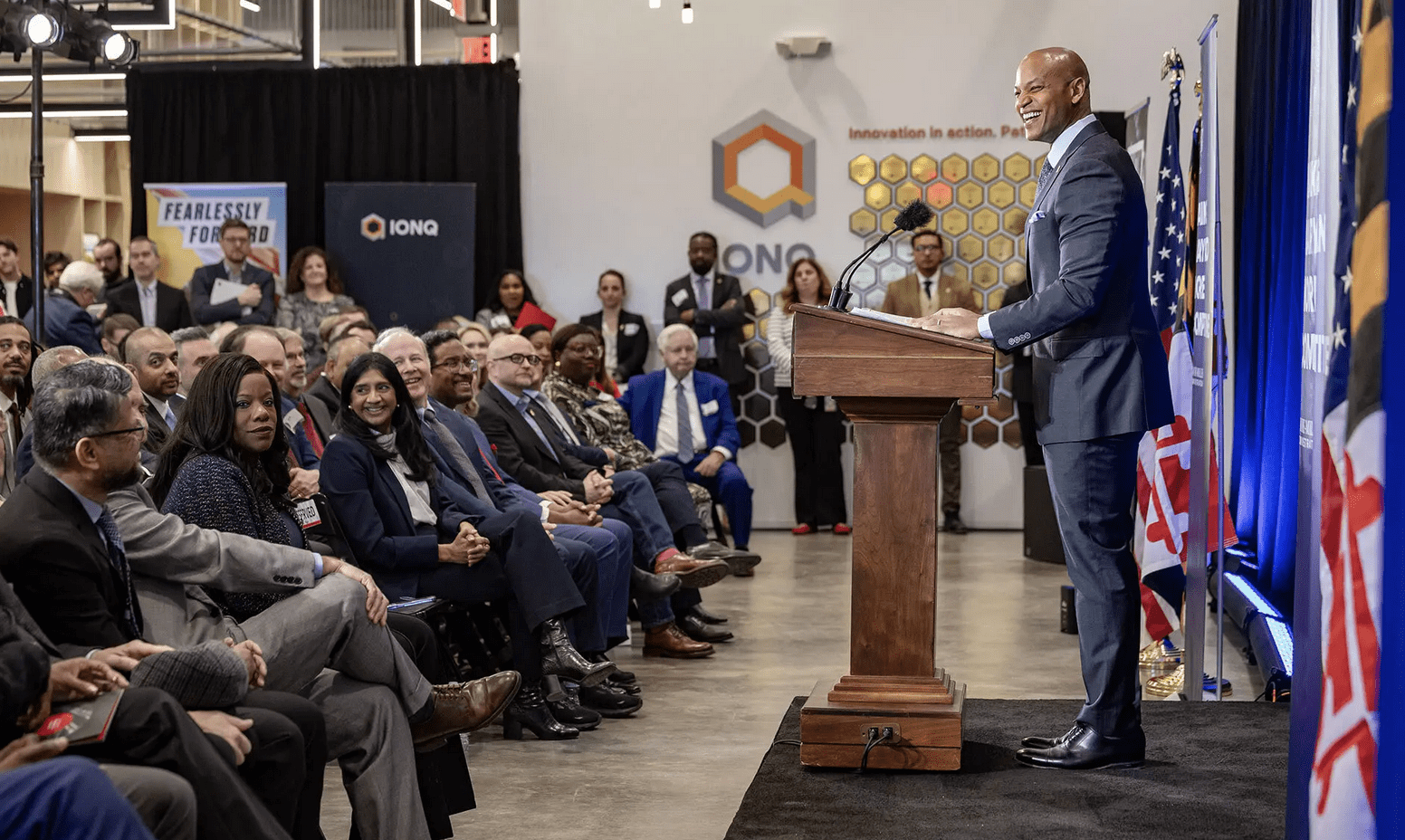
Moore Announces $1B ‘Capital of Quantum’ Initiative Centered at UMD
Maryland Gov. Wes Moore joined University of Maryland President Darryll J. Pines and IonQ Chairman Peter Chapman to announce the “Capital of Quantum” initiative, a landmark public-private partnership, to catalyze $1 billion in investments and position the state as a global leader in quantum information science and technology.

UMD and IonQ Partner to Advance Quantum Computing in Support of National Security
UMD will work with the quantum computing hardware and software firm IonQ, based in the university's Discovery District, to advance quantum computing and enable it to contribute to national security.

Art-Science Projects to Explore Quantum Creativity
Quantum researchers and creative scholars and artists at UMD are collaborating on seven newly funded research collaborations that will explore novel ways to engage people in thinking about our relationship to counterintuitive aspects of physics and technology that will shape our collective future.
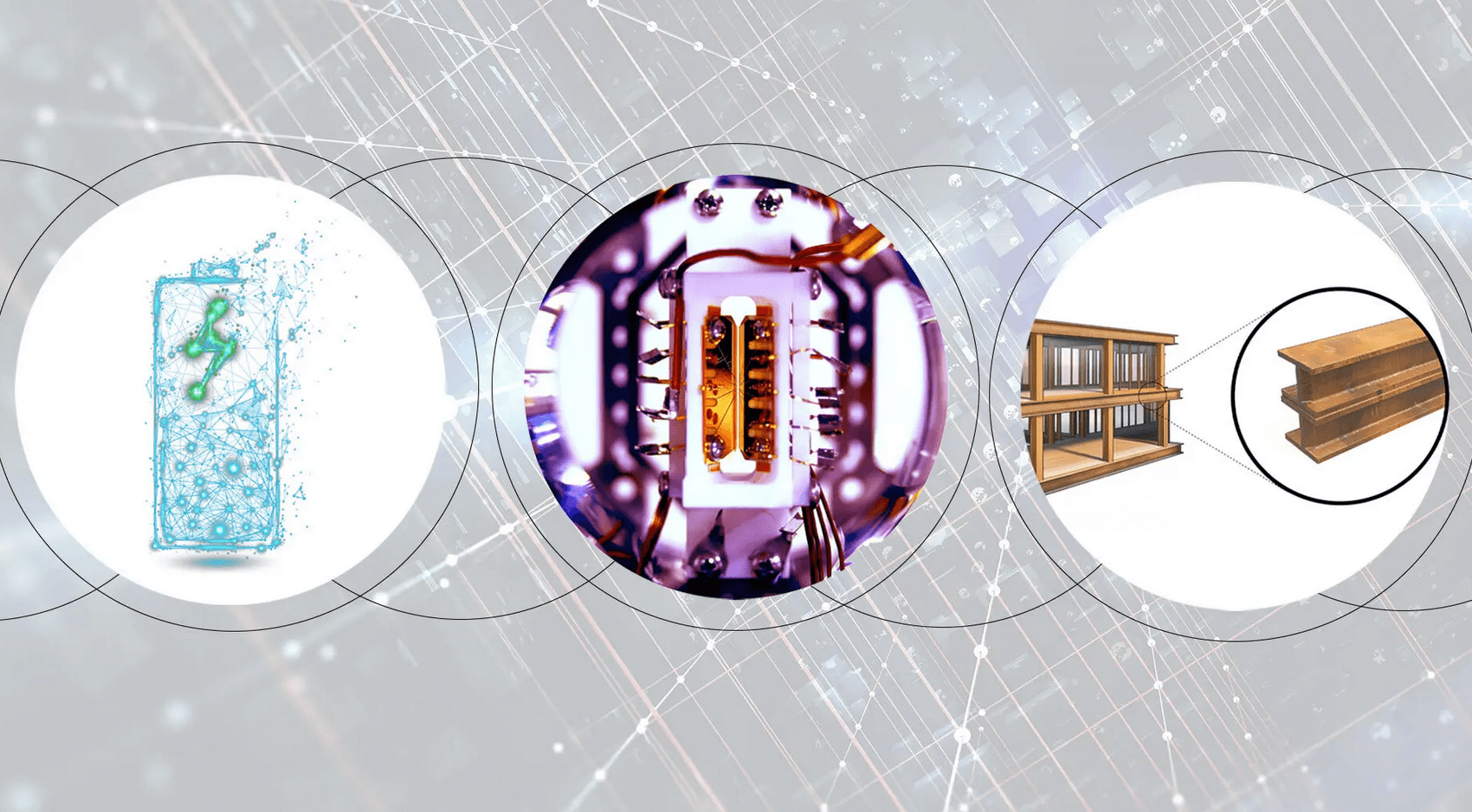
$2.3M in State Grants Awarded to UMD-Affiliated Innovation Projects
Three UMD-linked startup companies and a quantum business incubator received more than $2.3 million in grants through a state program aimed at bolstering innovation infrastructure development.

